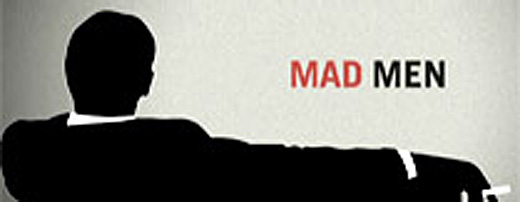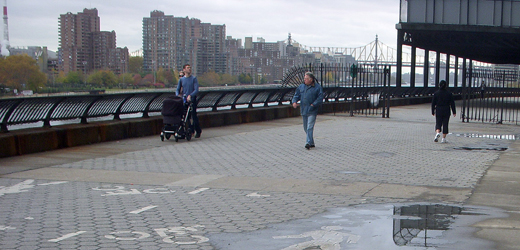Mad Men Note: Why Are We in the Living Room?
Sunday, November 8th, 2009
Everything was amazing about the season finale, but the award for standout amazingness goes to Don’s three pitches. Or does it go to Jon Hamm for pulling them off?
Last season, Jon Hamm took some time off to do an evening of Saturday Night Live, the highlight of which was a spoof ad selling “Don Draper’s Guide To Picking Up Girls,” or somesuch. Tonight, Mr Hamm bested that performance with “Don Draper’s Guide to Looking Sharp on a Diet of Humble Pie.” There are Komodo dragons out there with a better lock on contrition.Â
But then being sorry isn’t what sells, is it?
During the third plea — Don’s visit to Peggy’s flat — I was so overwhelmed that I had to reach out for Kathleen. It was as though an old school friend had been assassinated, or elected Holy Roman Emperor. I was shaken to the core of my vitals. The lighting helped. Elizabeth Moss, an alluring young woman in real life (at least as perceived from an aisle seat in the third row, last spring), was shot to look like a cross between the Bamian buddhas and Queen Victoria. If Don’s “please help me” speeches were arresting, that’s because his interlocutors — Roger Sterling, first; then Peter Campbell; and, finally, Peggy Olson — knew who was talking to them: a consummate adman. And yet each one of them acceded (“acceded” being the polite word for “fell for it”). Maybe that’s what they mean by “basilisk stare.”
Don is no basilisk, though. He rattled Betty in the middle of the night and called her a whore. This was an awful thing to say, but it was also Don’s way of saying “goodbye,” even if he didn’t know it. If we find, at the dawn of next season, that Betty and Don are still together, we’ll know that the relationship has been reconstituted from the ground up. I’m thinking of the end of Joseph O’Neill’s Netherland.
Rachel saw our reunion as a continuation. I felt differently: that she and I had gone our separate ways and subsequently had fallen for for third parties to whom, fortuitously, we were already married.
I’m not counting on that, though. I’m hoping that Don and Betty will have moved on from their profoundly ill-fitting and unsatisfying marriage. Kudos to Sally Draper for turning on her mother for the truth: “Did you make him leave?”
The only way to have made the episode even better would have been to play the David Rose recording of “The Stripper” when Joan Holloway rejoined her new colleagues and took charge as quartermaster. It would have been wholly wrong, that music, but it would have been gala fun.
What was gala fun was Don’s grin: “We’re negotiating.” All those white-white teeth, held in reserve for kills such as this. Spielberg can eat his heart out: the real McCoy didn’t need animatronics or DNA revival, but was trying, probably desperately, to find a script, a director, and a chance.
Here’s to next year!










